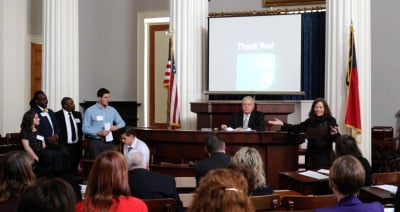Monday, February 17, 1868
The Convention was called to order on Monday at 10 o’clock, Mr. Pres. Cowles in the Chair.
Mr. Rich called up the ordinance proposed by the Committee on Immigration, calling for an immigration agency in New York. A commissioner would be hired to encourage immigrants to purchase land in North Carolina. Delegates debated the salary of the commissioner with Mr. Ashley commenting that there was a necessity for a man of talent, and living was very high in New York.
Before resolution, the convention turned to the draft constitution to the provisions from the committee on corporations. Mr. Tourgee proposed striking sections that allowed a state bank to issue money. Mr. Rodman said if Mr. Tourgee’s amendment prevailed and national currency was withdrawn, only the bank notes of other States would circulate here. Mr. Tourgee’s amendment was lost.*
The majority report of the committee on homesteads was then considered. Mr. Jones of Caldwell, chairman, provided remarks on the importance of the provisions:
“Speaking for myself, Mr. President, I do not hesitate to say that a homestead secured hereafter to all persons will operate as a powerful incentive to the laboring man to obtain one through the means of industry and economy; that the ruinous system of credit heretofore prevalent amongst the people will be circumscribed within legitimate bounds. Agriculture will be improved and production largely increased, the moral and political standard of our people elevated, a love of home and country cherished and mothers and their children will be better protected from the sudden vicissitudes of fortune.”
In regard to providing property rights to women, Mr. Jones notes that it is a right never before allowed, but just and merciful now. Further discussion was postponed until Thursday next at 11’oclock.
The convention reconvened at 7:30 p.m. Mr. Rodman moved to amend the bill of rights to allow exceptions to when habeas corpus could be suspended. Among the delegates who spoke against such a measure, Mr. Welker said that it was almost the only bright spot in the record of the Confederate Congress that it was with the utmost difficulty that they could be got to suspend the writ, even for a short time. The members of this Convention who remembered Libby and Salisbury would be careful how they voted. Let the fundamental law recognize tyranny. But ever and always the right to a speedy trial of the citizen. The amendment was defeated.
Delegates again debated debt repudiation.
On motion the Convention adjourned.
Resources
Ferrell, Joseph, ed., Compilation of the Official Report of the Proceedings of the Convention (Chapel Hill, N.C.: unpublished manuscript 2007). (See day 8 for fuller explanation of this resource.)
*Joseph Ferrell describes the impact of another proposed amendment by Mr. Rodman to strike section 2: “Mr. Rodman was right. The meaning of the section had puzzled North Carolina legal scholars for a century. During the work of the 1969 State Constitution Study Commission, John L. Sanders discovered the following section in the New York Constitution of 1846: Article VIII, Sec. 2: “Dues from corporations shall be secured by such individual liability of the corporators and other means as may be prescribed by law.” When the word “corporators” is given its modern form of “incorporators,” the meaning of the section is clear. The phraseology of the North Carolina Constitution and that of New York is too similar for coincidence. In fact, a comparison of the two documents shows that the framers of the North Carolina Constitution copied Article VIII of the New York Constitution virtually verbatim, even to the peculiar placement of Sec. 11, which relates to municipal corporations despite the title of the article.” (FN 97 in the resource listed below)
*The debate and other quotes are close to verbatim from the reported resources with some adjustment to put all comments in first person, present tense.
Recommended reading



